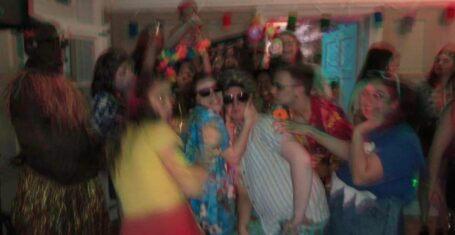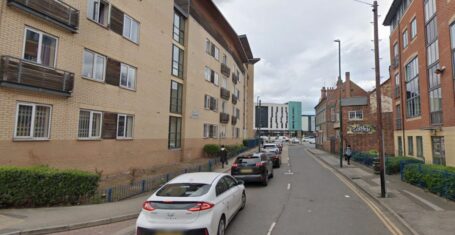
A guide to thrifting and sustainable fashion in Notts
Buy well, choose less, make it last
A weekend spent in the city and my suspicions were confirmed – Nottingham really does have it all when it comes to thrifting, charity shop hauls and sustainable fashion. But what is sustainable fashion and why is it all the rage right now?
I’ve learnt that sustainable fashion is concerned with more than just fashion textiles and the products themselves. Sustainable jungle recognises the sustainable fashion movement as “a movement and process of fostering change to fashion products and the fashion system towards greater ecological integrity and social justice.” As the planet faces a climate emergency, the impact of buying second-hand and sustainably sourced clothes could be huge. Charity organisation Clothes Aid says that over 350,000 tonnes of wearable clothing goes to landfill in the UK every year.
In this article I guide you through the best spots to be found shopping, thrifting and ultimately supporting something far greater than the fast fashion industry that seems to dominate the market. The main ethos here is to buy less but to make it last. In a world of consumerism, perhaps we all have something to give.

City Centre
The Hockley area, just a short walk down the hill from the Lace Market tram stop is a mecca for preloved clothes, particularly t-shirts, shoes and hoodies. White Rose stores, founded by two Nottingham Trent University graduates in 2009, are dotted about Nottingham city centre and all support the Aegis Trust which works to prevent genocide, crimes against humanity and mass atrocities worldwide. White Rose’s website explains that the brand is “driven by a distinct purpose to reduce fast fashion’s impact on the environment, reduce textile waste, and encourage our customers to make kinder choices when it comes to purchasing and repurposing clothing.” I copped a pair of Nike Ebernon Low for £22. Buying second hand items really does help to save on money and giving an old item a new lease of life feels good.
A brisk walk from Old Market Square tram stop and you’ll find 101 Vintage with its dazzling orange shop front. It’s a more upmarket store and whilst it’s a personal favourite I’m typically in there just to have a browse. Around the corner from Nottingham Station tram stop and there’s Hopkinson store, it’s an eclectic mix of up-cycled arts and antiques with a bunch of vintage preloved clothes and accessories.
Hey, Macklemore, can we go thrift shopping?
It just so happens that there’s a new thrift store in town. Owned by owners of brand ‘Ragyard’, clothes designer couple Nick and Josie opened doors to the public at the start of February and have been busy ever since. The store is found in the busy Lace Market region and hosts a vast selection of clothes and accessories. 20-30 per cent of the items are unique test pieces that are one of a kind as they never went into production. Clothes are sold at a single price or multi-buy price. I got three tops for £10 and a retro bag for a fiver. Levi jeans are the main vintage items nestled amongst newer pieces. The shop is open Monday-Saturday from 9am until 5.30pm and Sundays from 10am until 4pm and will soon boast a completely vintage floor.

Beeston
Beeston, a short walk from University Park campus has quite the selection of charity shops. Nottingham actually tops the list as the UK capital of charity shops, bragging almost one hundred charity shops within five miles of the city centre. Beeston is my go-to for sourcing t-shirts. My top two would be the Salvation Army charity shop which has an abundance of clothes and Treetops charity shop which has fewer items but a greater diversity in their range. Going early in the morning guarantees finding better stock so that you don’t miss out on the best buys. It’s less populated by students, so the stock hasn’t been absolutely ravaged yet, meaning you can often get some pretty sick finds.
Concrete Jungle
What better way to find out about sustainable fashion in Nottingham than a chat with Notts-based clothing brand Concrete Jungle. I spoke with founder Tom Inch. Sustainability is at the heart of what they do. Everything they design and make has the earth and its welfare in mind. But what does that involve?

They use 100 per cent organic cotton and other sustainable materials supplied by clothing brand Stanley Stella. Organic cotton is grown without chemical insecticides, fertilisers or pesticides unlike normal cotton. This means that no hazardous or toxic chemicals run off from the soil into water sources nearby. Concrete Jungle’s printing manufacturers are based in the UK and payed the UK living wage. All inks they use in production are vegan and 100 per cent phthalate free. Concrete Jungle also use recycled and biodegradable packaging to limit their waste in the environment. What’s even better is that a tree is planted for each sale. They run pop-up stalls around central Nottingham.
Vintage pop up shops
Just this week there was a vintage pop up shop and collaborative Dopplle clothes swap shop held on University Park campus by ResX and Sustainability Society. Notts uni has quite a few vintage pop ups on campus, whether they’re kilo sales or stalls, so keep your eyes peeled for announcements.
Hidden Garmz holds pop up events with live DJs and a range of stalls; from streetwear to traditional vintage clothing. The venue has a bar, and popular artists such as Ben Snow frequently have DJs sets. Their event this March is in support of the ongoing crisis in Ukraine, people are able to donate clothes to those in need.
One Day Vintage hosts vintage pop up stalls by students, for students, frequenting at universities across the UK.
And that’s a wrap on sustainable fashion in Notts. If ever there was a time to buy less, it is now. The planet needs you to look at preloved items in a new light. We’re seeing that more people than ever before are buying consciously by supporting the second-hand market of charity shops and thrift stores. There’s power in a shifting culture towards fashion. Sustainable fashion isn’t just a fad, it’s a cycle that supports both communities and customers. In the words of Bo Derek, “Whoever said that money can’t buy happiness, simply didn’t know where to go shopping.” I hope that now you do.
Related titles recommended by this author:
• ‘We don’t want to strike’, Uni of Nottingham lecturer on the picket line says
• Angry about strikes? We need to support our picketing lecturers and here’s why
• Students are occupying Coates Auditorium in support of the strikes









































